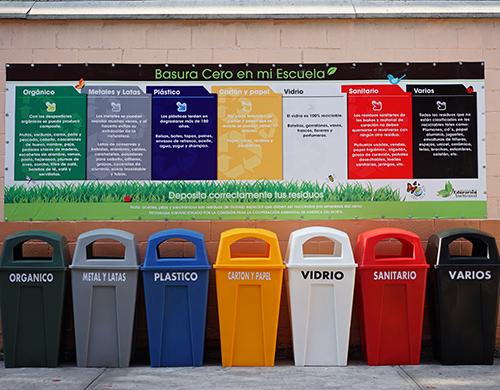Zero Waste at My School – School Waste Separation and Recycling Program
Organization: Organización de Educación Ambiental, A.C.
Location:
Low-income public schools in the Cuauhtémoc and Azcapotzalco boroughs of Mexico City.
Country: Mexico
Other Organizations Involved:
- Network of Schools for Environmental Education and Awareness (Red de Escuelas por la Educación y la Conciencia Ambiental—Reeduca)
- Organi-K
- Voluntarios Verdes, A.C.

Background
The unsound management of solid waste is one of the most serious environmental problems, given its high negative impact on natural resources and human health. Therefore, it is necessary to foster a culture at schools, aimed at alleviating the environmental and social problem caused by trash.
This project holds that the way to address Mexico’s waste problem is by educating the public, heightening environmental awareness from an early school age. The implementation of environmental education programs at schools will help to drive the necessary changes in environmental policies regarding the management of urban solid waste.
The Zero Waste at My School project corresponds to the plans and programs set out in the “Path to School Improvement” and “Quality School” initiatives of the Ministry of Public Education, among others, that seek to foster the engaged participation of students and teachers, and build environmental stewardship capacities.
Goals
- To elevate environmental awareness at schools and to improve the conditions, quality of life and health of students and residents in general, as school waste is a source of disease and latent pollution.
- To implement the Zero Waste at My School program in 10 low-income schools in Mexico City, positioning it as a proven, innovative and viable educational model for teaching and learning on a new approach to waste management, contributing to creating more environmentally respectful citizens.
- To provide schools with the necessary tools to achieve the objective, namely specialized training, educational materials and infrastructure in line with the international standard, with a view to achieving the Zero Waste standard with at least a 90 percent recovery of waste.
Main activities
The following activities will be carried out, based on an environmental evaluation at the schools:
- Specialized training on separation and recycling for teachers.
- Design and development of didactic material, with content review.
- Practical application of learning set out in the Technical Guidance Manual for Teachers.
- Infrastructure consisting of seven plastic containers, colored according to the international standard, to install “green points” (collection centers) at the participating schools.
- Separation and recycling workshops for practical learning on the new culture, aimed at the school community as a whole.
Results
Thanks to the supporting teaching system, the Zero Waste at My School project will facilitate the adoption of appropriate waste separation habits at the schools and enable an awareness of the importance of recycling as a fundamental element for the conservation of natural resources.